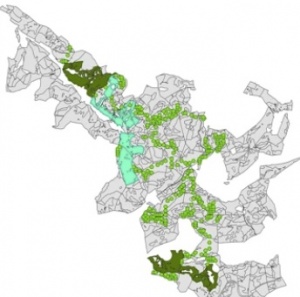
Institutional investors in sustainable land-based assets around the world rely on a management firm for superior stewardship and financial yields. Over decades, one independent firm has established an innovative, disciplined approach to become a global leader in conservation, real estate management, and acquisitions and sales. Its continually changing portfolio—comprised of millions of acres worth millions of dollars—benefits a diverse clientele of public and private investors with evolving risk and return needs. In generating alpha—a return above the sector’s benchmark—the management firm balances many factors, such as short-term gains and long-term appreciation, and the environmental and financial values of its assets.
Challenge
To allocate lots to investors, the firm developed a proprietary mathematical optimization model—a mixed integer program (MIP). Each lot has a set of attributes; each investor has a target value for each attribute. The model is used to determine a “best” allocation, deviating from the targets as little as possible.
The management firm was required to obtain a third-party expert audit of the model for its investors and asked for proposals for auditing the existing model. After preliminary analysis based on documentation and a single instance of the model, a Princeton Consultants team believed there were possible alternative formulations and data refinements that could boost performance, and suggested that remediation would most likely be needed as a result of the audit.
Model Review and Validation
The model, which is critical to the firm’s operations, was taking many hours to solve, so the company’s leaders decided to postpone the audit and first retained a Princeton Consultants team to conduct a model review, remediate any issues, and recommend improvements. The team conducted a formal model review and validation according to Princeton Consultants’ quality assurance methodology for advanced analytics.
First steps included interviews of firm personnel to understand the business problem and the structure of the existing model, analysis of data sources, review of data sets, and experimentation to understand the challenges for obtaining good performance. The team suggested modifying the existing formulation to allow more precise measurements of the allocations of assets to investors. Next, the team created alternate models, developed a potential reformulation to account for differences in attributes, and rescaled the model to appropriately handle any numeric precision and accuracy issues. To improve the application, the team experimented with multiple model instances to ensure solution reliability and robustness.
Recommendations and Reformulation
Princeton Consultants recommended a new approach to solve the firm’s optimization problem and was asked to reformulate the model. The reformulation better addressed the objective of allocating lots to investors to meet the desired percentage of each attribute and improve model performance and stability. It successfully solves in a fraction of the time of the previous formulation and provides benefits including increased numeric precision; elimination of manual configurations; and straightforward measure of solution quality.
Audit
After the project to remediate the existing model, a separate Princeton Consultants team evaluated and verified the appropriateness and stability of the logic and function of the new model. The team reported that the new model formulation, code implementation, and data inputs will generate the expected result to the given business problem consistently and without any sources of bias via the input data ordering or multiple model runs.
The firm’s leaders valued the approach and diversity of the Princeton Consultants services. While they were initially considering an audit of the existing model, they appreciated the recommendations to first review and remediate the model, followed by using a different team for the audit process. The successfully reformulated model will help the management firm continue to deliver alpha through its investment services and excel in asset stewardship on three continents.
For more about Princeton Consultants’ advanced analytics model review service, visit this webpage.
